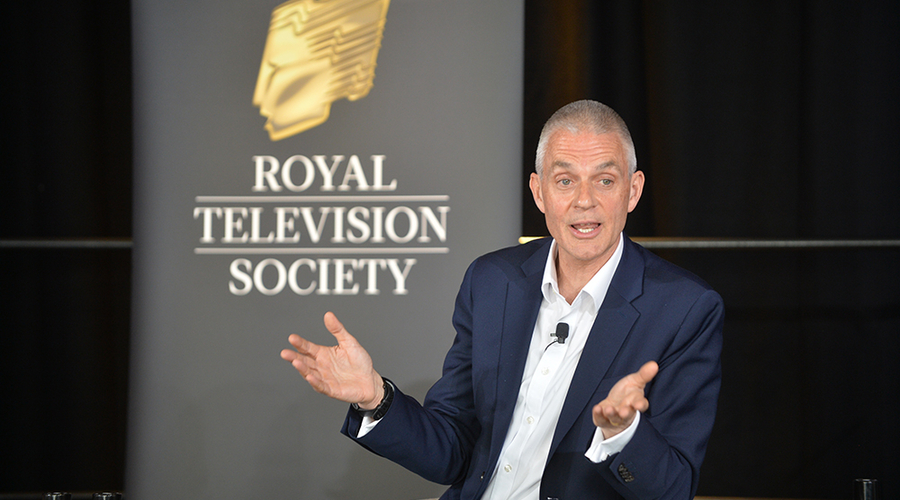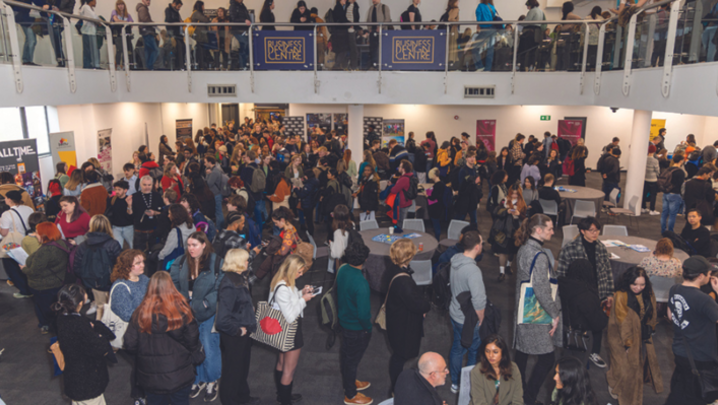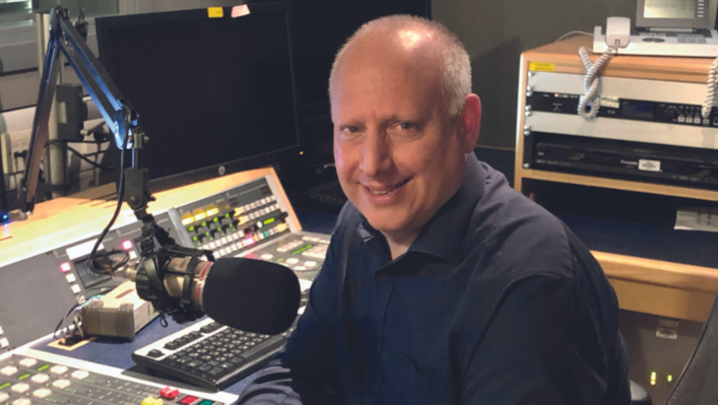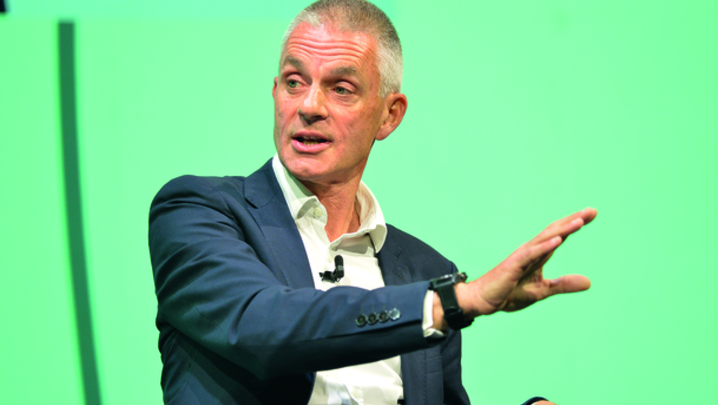Tim Davie set out his vision for a digital-first BBC at an RTS event attended by media leaders
The BBC is gearing up for a multi-front battle that will see it leaning into AI and UK-centric algorithms, commercial partnerships with deep-pocketed tech companies, and a “progressive” licence fee.
Director-General Tim Davie delivered the corporation’s latest set of priorities at a standing-room-only RTS event held at the IET in London on 26 March. In the audience were super-indie bosses, senior producers and talent, as well as BBC colleagues, including the newly appointed BBC Chair, Samir Shah, Chief Content Officer Charlotte Moore and BBC Studios CEO Tom Fussell. Also present was Ofcom Chair Michael Grade.
The DG announced several new initiatives, ranging from the global expansion of BBC Verify to the creation of unique algorithms to integrate all BBC services under one “search” function. But it was Davie’s proposals for funding such innovation amid the drive to shave £500m from overall costs that were most notable, particularly his desire to cosy up to tech giants.
“We will need to work more strategically with the best tech companies to co-create solutions, and form business partnerships that save money, inject capital and create better products,” said Davie, nodding to headline-grabbing commercial partnerships such as the corporation’s exclusive global deal with Disney for Doctor Who.
Part of relieving financial pressure on the BBC involves asking the UK government to shoulder the “long-term funding” of the World Service, said Davie. “Not properly funding one of the UK’s most valuable soft power assets makes no sense, economically or culturally,” he added.
Elsewhere, the DG was upfront regarding his views on licence-fee reform, and his refusal to be “defensive about the future”. “It is right to ask fundamental questions about [the licence fee’s] longevity in a world that is now full of so much choice,” said Davie. At the same time, he warned, the BBC must be “appropriately cautious” about “unpicking a multi-genre BBC that leads the market rather than is simply about market failure.… We will proactively research how to reform the licence fee post-2028, looking at its scope, how it could be more progressive and making sure its enforcement is fair and proportionate.”
In a Q&A with Radio 4 Today presenter Martha Kearney, Davie later said it was “right” that the BBC Board was looking at potential concessions as part of licence-fee reform. “Do people of a certain age get a free licence? Should we stop there? What can we do? What are the other options? That doesn’t necessarily imply means testing; there could be a number of ways to make it more progressive. I just think the idea of sitting where we’re at is the wrong way.”
In 2025, the BBC will open its “biggest ever consultation process” to allow the public to “formally drive the debate” around the future of the corporation, said Davie. “Our aim is to make contact and get feedback from hundreds of thousands of people — and we do so with an open mind.”
Davie painted an ominous scene at the outset of his half-hour speech. He warned that “jeopardy is high” and that “the future of the UK — democratically, socially and culturally — is at risk” in the face of threats to civil society and its free press and “noisy, cultural disinformation”.
What would it take to succeed in such a fraught climate? Doubling down on “what audiences see is our unique value”, answered Davie.
His speech revolved around three key objectives: pursuit of the truth with no agenda; backing British storytelling; and bringing British people together.
Pursuing truth without an agenda
As part of Davie’s refreshed journalistic agenda, the corporation vowed to use AI proactively and on its own terms, while “always holding on to our published principles, never compromising human creative control, supporting rights holders and sustaining our editorial standards”.
To this end, the broadcaster was working with major tech companies on ambitious BBC-specific pilots that will be rolled out in the coming months. Davie didn’t elaborate on what these might look like.
The BBC plans to increase fact-checking of sources, use translation and reformatting technology “to take our best content across media and languages”, and offer more tailored learning services such as Bitesize.
“This is all AI for good,” said Davie. “We are developing unique ethical algorithms that dramatically increase personalisation but are not simply driven by individual recommendations. We want to keep other factors in play, like serendipity or curiosity, and an interest in what our BBC editors may judge to be important stories.”
The BBC was also investing in its year-old fact-checking service BBC Verify — billed on its May 2023 launch as “explaining the ‘how’” — which will expand globally.
It will also launch a new investigations brand that will be powered by 70 multimedia investigative reporters across the country. Meanwhile, BBC.com and the official BBC app will relaunch internationally. The aim is to “build up the division as the number one English online news brand globally”.
Backing British storytelling
Davie’s content-oriented message felt familiar in its targeting of global streamers and their perceived inability to tell authentically British stories.
“This is not a criticism,” insisted Davie. “They are very impressive companies that make many good shows, but there is no doubt that global economics will drive them to a different place editorially from a UK player.”
Meanwhile, the licence fee supports 14,000 external creative companies, said the DG, with 50% of the economic impact falling outside London. “The BBC is a growth and innovation fund for the UK and we want to do even more to back British storytelling.”
To this end, the BBC will continue to shift more production, editorial leadership and decision-making away from the capital: more than 60% of TV production is set to take place outside London by 2026, and 50% of radio and music by 2027.
“Within the BBC, you can now build a career through to a very senior level, such as a network news editor, without even coming to London,” said Davie. “We will work very hard to keep opening up the organisation and the industry to all, which remains a big issue.”
The corporation remains on track to meet its 25% target for staff from a “lower socio-economic” background by 2027 — a quota first set two years ago as part of the BBC’s 2022-23 annual plan.
Bringing people together
Davie was again tech-oriented in his musings on community building, suggesting that UK-specific algorithms were necessary to protect the fabric of British society from external geopolitical forces.
“We can choose not to rely solely on US and Chinese tech companies that may not have the interests of a shared British culture and our democratic, tolerant society at their heart,” warned Davie. “This will require us to create unique algorithms to serve our values, for good. Algorithms and AI that bring us closer, not drive us apart. Personalisation, of course, but not driven by narrow commercial return.”
The DG promised more live streams across BBC services “allowing you to connect communally to shared experiences in real time”. Notably, in the forthcoming local elections, the BBC would host mayoral debates in every combined authority.
Most significant, however, was the corporation’s plan to undertake “a total rewiring of the data and ‘horizontal’ systems, such as Search, that underpin our online offering. In the future BBC, you’ll be able to move across the content seamlessly, not limited by media type,” explained Davie. “If you’re interested in a topic, you should be able to easily mine the whole BBC – from archive to live output, [across] audio, video, World Service and local [services].”
Q&A
You said at the outset of your speech that the future of the UK is at risk democratically, socially, culturally. That’s quite a claim. And quite a claim, also, that the BBC could be a part of the change.
You don’t want to overstate the role of the BBC itself. All I would say is: look at the data globally, look at the trend lines. Look at the trend lines on the free press, in terms of free democracies.
We’ve had a good run, our generation. We’ve had a situation in which we have been in a peaceful society; we have taken things for granted. And the history of humanity is to take those things for granted, and I worry about it.
I think those risks are real. Independent institutions that are independent of politics… have proven time and time again to be an essential counterweight to something that is purely about politics.
There’s a dilemma for the BBC, isn’t there? There are many critics concerned about the way the BBC is moving into the commercial landscape.
We absolutely need to be careful how we develop commercial revenue. There are two things on my mind when I say that. First, we absolutely want to protect a commercial-free offer in the UK at all costs. [Second], we talk about the funding, but not enough about editorial. In Henley, where I live, I’m sure people would pay a subscription [for the BBC]. But then, suddenly, we start making things for a certain audience. And I don’t want to do that.
Our target audience is everyone. And that brings stresses and strains as you try to bring everyone in. And, sometimes, it feels like a really tough cause — but it’s absolutely worth the pain.
So the first thing is, we absolutely don’t want to have a commercially funded UK offer.
Having said that, where we can monetise around that and create and attract capital, and do joint ventures with, say, Disney and monetise some of our archive in the UK, I think that is appropriate.
You talked about technology companies. What are you planning there?
I am worried because [scale is] one of the things we don’t have. You talk to the tech titans, and you do need deep pockets to compete. I think we do need major global partnerships with some of these tech players.
We can bring an enormous amount [to the table]. We’re an incredibly good testing ground: we can pilot things that maybe others can’t develop. But I don’t think we can do that alone, as a walled garden of R&D. We’re going to have to work with big companies.
We’ve done this for a while: look at natural history, which has been developed through partnerships, with the majority of funding coming from outside the UK.
So I think we need to push that [approach] into other areas, to attract capital, to create joint businesses. On our own, I don’t think we’ll have enough firepower.
Report by Manori Ravindran. ‘A BBC for the future’ was a speech given to the RTS by BBC Director-General Tim Davie at the IET, Savoy Place, central London, on 26 March. Radio 4 presenter Martha Kearney hosted the Q&A.







